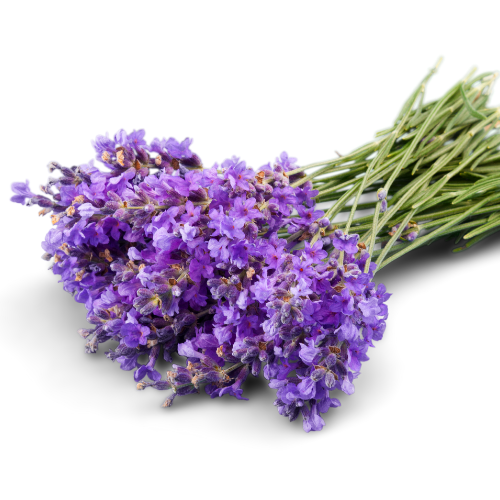
We love it for..
Insomnia,
Lavender is an important relaxing herb, but it is better known for its sweet-scented aroma than for its medicinal properties.
Why We Love It
■ Nervous system Lavender is well known for its soothing and calming effect and is combined with other sedative herbs to relieve sleeplessness, irritability, headaches, and migraine.
It also helps to alleviate depression.
■ Digestion Like many herbs with a significant volatile oil content, lavender soothes indigestion and colic, and relieves gas and bloating.
■ Asthma Lavender’s relaxing effect makes it helpful for some types of asthma, especially where excessive nervousness is a feature.
■ Essential oil The oil is an invaluable first aid remedy. It is strongly antiseptic, helping to heal burns, wounds, and sores. Rubbed onto insect stings, it relieves pain and inflammation, and can be used to treat scabies and head lice. Massaging a few drops on the temples eases headaches, and five drops added to a bath at night relieves muscle tension, tones the nervous system, and encourages sleep.
Research Resources
| Scientific Name | Lavandula angustifolia syn. L. officinalis (Lamiaceae) |
| Description | A perennial shrub growing to 3 ft (1 m), with spikes of violet- blue flowers extending above the foliage. |
| Constituents | Volatile oil (up to 3%) containing over 40 constituents, including linalyl acetate (30–60%), cineole (10%), linalool, nerol, borneol, Flavonoids |
| Habitat & Cultivation | Native to France and the western Mediterranean, lavender is cultivated worldwide for its volatile oil. It is propagated from seed or cuttings and needs a sunny position. The flowers are picked in the morning in high summer and are dried, or distilled to produce essential oil. |
| Related Species | Spike lavender (L. spica) yields more oil than L. officinalis, but of an inferior quality. L. stoechas is used as an antiseptic wash for wounds, ulcers, and sores in Spain and Portugal. |
| Parts Used | Flowers are harvested toward the end of flowering, when the petals have begun to fade. Flowers contain high levels of volatile oil. |
| Key Actions | Antispasmodicm, Relieves anxiety 108, Antidepressant, Neuroprotective, Antimicrobial |
| Cautions | Do not take essential oil internally except under professional supervision. |
Clinical Studies
■ Lavender oil A 2014 clinical trial found lavender oil taken internally
to be more effective than both a placebo and a conventional tranquilizer in relieving generalized anxiety. It also showed antidepressant activity. Other studies have found similar benefits and tended to confirm relaxant, antidepressant, and gently sedative activity. The oil is thought to have low toxicity and significant antibacterial and antifungal activity.
■ Flowers Lavender flowers and oil have similar properties. Although
little research has been conducted,
it is likely the flowers have a significantly greater carminative and neuroprotective activity. Applied externally, flower extracts are insecticidal and rubefacient (irritant and stimulating to the local circulation).
Source: Encyclopedia of Herbal Medicine